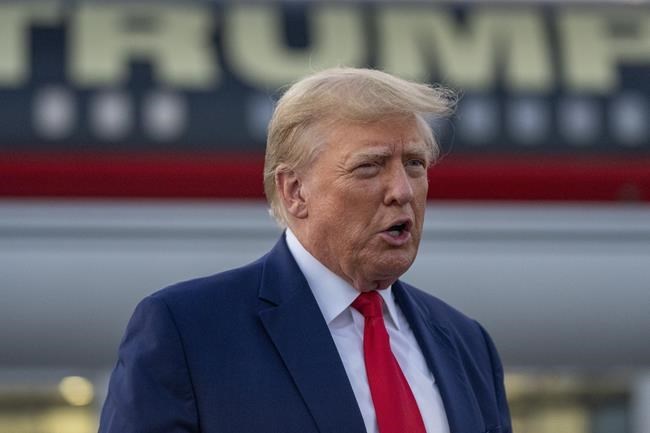WASHINGTON — Canada's ambassador to Washington typically doesn't get a whole lot of notice before the president of the United States makes a decision with the potential to reverberate beyond the country's borders.
But when President Joe Biden signed a measure to better ensure U.S. companies and workers reap the lion's share of the benefits of American research and development, Kirsten Hillman had known about it for nearly two months.
"They wanted to talk about it," Hillman said — and in particular, make clear that it would have no impact on the "hundreds and hundreds" of bilateral collaborations that routinely happen between the two countries.
"They were the ones who reached out to us, to make sure that we understood that this wasn't about affecting the way in which those projects take place."
Discussions ensued all through June, including an "explicit assurance" that the order would not inhibit any Canadian role in the commercialization or manufacture of innovations emerging from those partnerships, she added.
"They made that very clear to us, and were very comfortable with us reiterating that publicly," Hillman said.
"They also said the White House would work with our government as the EO was implemented, just to ensure that this strong relationship and these sort of assurances that they've given to us are not diminished."
It wasn't always thus: veterans of Canada's diplomatic corps in Washington have long quietly grumbled that over the decades, getting the White House to consider their interests often felt like a Sisyphean task.
Clearly, a lot has changed since early 2021, when Biden signed the death knell of the controversial Keystone XL pipeline on Day 1 of his presidency with only a couple of days' notice.
"This particular scenario is that they explicitly thought about us as they were developing this particular policy," Hillman said. "I do think that's slightly different."
It's a testament to the ongoing outreach work of the embassy, and may also be a tangible symptom of the goodwill and bonhomie that was on visible display in March when Biden finally paid his long-awaited visit to Ottawa.
But things could well be about to change again, at least if Donald Trump has anything to say about it.
"Our country is being plundered," the former president wrote in a letter last week to the Wall Street Journal, a rebuttal of sorts to an editorial decrying his vow to impose a 10 per cent tariff on all foreign imports.
Such a measure would, in his words, "stop this hemorrhaging of America's lifeblood," help restore the country's reputation as a "manufacturing powerhouse" and send a clear message to the rest of the world.
"The tariff is an important tool of U.S. national security and diplomacy," he wrote. "I am proud to be the only candidate for president who believes in true economic nationalism."
Trump has also made clear that if elected, he intends to run riot over Biden's climate change strategy, in particular the hard pivot towards electric vehicles — a key element of the current administration's strategy in which Canada has a major stake.
He has been emphasizing that opposition all week, hoping to capitalize on the growing prospect of a long and difficult strike in the U.S. auto sector and undercut Biden's efforts to curry favour with organized labour.
"The only acceptable policy for (United Auto Workers) members should be the complete and total repeal of Biden's catastrophic EV mandate," he said in a statement Thursday.
Meanwhile, despite his escalating legal troubles, polls suggest Trump is running away with the race to be the Republican presidential nominee, and that Americans are less enthusiastic than ever about voting for the 80-year-old Biden.
Enter Foreign Affairs Minister Mélanie Joly, who broke with customary diplomatic protocol shortly after Trump detailed his tariff plans when she hinted at Canada's "game plan" should he get re-elected next year.
She offered few details. But from where Hillman sits, it's less about drawing up a new strategy than it is about picking up the tempo of the current one.
Across the U.S., the embassy has long sought to identify those people who are in positions of political power or likely to ascend to them, as well as the operatives from whom those people are likely taking advice, she said.
"We map that out across the country all the time," Hillman said. "We are doing it in relation to the issues that matter to Canada that are relevant for any particular individual lawmaker or potential lawmaker across the country."
The conversations invariably turn on a myriad of issues of mutual interest to both countries, from supply chains to critical minerals, energy security to tackling the fentanyl crisis, clean water to climate change.
The idea is to establish a "baseline of understanding," as well as a relationship, regardless of any local or national election outcome, so there's always a foundation to work from, Hillman said.
"Our job is to understand who we need to talk to, and understand what we need to talk to them about," she said.
"The only way to establish that baseline of understanding is just never stop, never stop giving those messages and talking to those people. Because you can't do it six months before the election."
This report by The Canadian Press was first published Sept. 8, 2023.
James McCarten, The Canadian Press



